一般过去时一般现在时对比
- 格式:ppt
- 大小:306.50 KB
- 文档页数:5
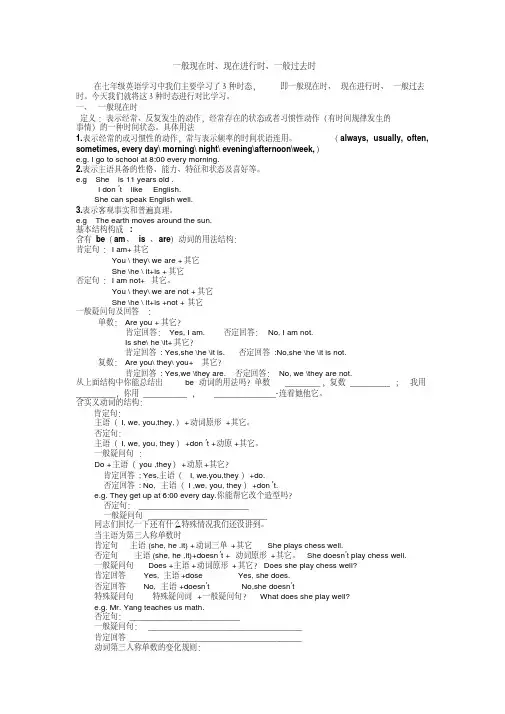
一般现在时、现在进行时、一般过去时在七年级英语学习中我们主要学习了3种时态,即一般现在时、现在进行时、一般过去时。
今天我们就将这3种时态进行对比学习。
一、一般现在时定义:表示经常、反复发生的动作,经常存在的状态或者习惯性动作(有时间规律发生的事情)的一种时间状态。
具体用法1.表示经常的或习惯性的动作,常与表示频率的时间状语连用。
(always, usually, often, sometimes, every day\ morning\ night\ evening\afternoon\week,)e.g. I go to school at 8:00 every morning.2.表示主语具备的性格、能力、特征和状态及喜好等。
e.g She is 11 years old .I don’t like English.She can speak English well.3.表示客观事实和普遍真理。
e.g The earth moves around the sun.基本结构构成:含有be(am、is 、are)动词的用法结构:肯定句:I am+其它You \ they\ we are +其它She \he \ it+is +其它否定句:I am not+ 其它。
You \ they\ we are not +其它She \he \ it+is +not +其它一般疑问句及回答:单数:Are you +其它?肯定回答:Yes, I am. 否定回答:No, I am not.Is she\ he \it+其它?肯定回答: Yes,she \he \it is. 否定回答:No,she \he \it is not.复数:Are you\ they\ you+ 其它?肯定回答: Yes,we \they are. 否定回答:No, we \they are not.从上面结构中你能总结出be动词的用法吗?单数________,复数_________ ;我用_________,你用__________ ,______________-连着她他它。
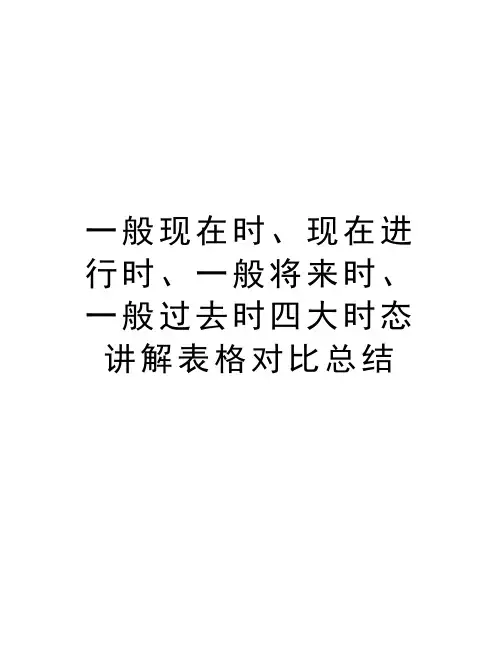
一般现在时、现在进行时、一般将来时、一般过去时四大时态讲解表格对比总结四大时态总结--------一般现在时、一般将来时、一般过去时、现在进行时一、一般现在时一般现在时表示经常性或习惯性的动作,常与表示频度的时间状语连用,如often, usually, always, sometimes, never, seldom, every week/day/year/month..., once a week, on Sundays等。
动词用原形。
当主语第三人称单数的动词变化规则:(只有在第三人称(he, she, it, 一个人名)为主语的肯定句中,动词才用三单式)(1)一般情况下,直接加s runs gets likes(2)结尾是s, x, sh, ch, o,前为辅音字母,结尾加es watches, goes, washes, crosses, mixes, does(3)动词末尾y,前为辅音,将y改为i加es study→studies fly→flies但在y前如果为元音则直接加s buys says plays(4)不规则变形 have—has二、现在进行时现在进行时表示此时此刻或现阶段正在进行的动作。
常与now, at this time, these days, Listen! Look! at(1)直接在动词后加ing. going, starting, working.(2)去掉词尾不发音的e,再加ing. leave--leaving, make---making.注意:如果单词结尾的e发音,则不能去掉,也直接加ing. see –seeing agree - agreeing .(3) 对于动词只有一个元音,而其后跟了一个辅音字母时,双写末尾辅音字母再加ing.sitting, beginning run – running stop – stopping cut – cutting control – controlling(4)以ie结尾,把ie变y再加ing。

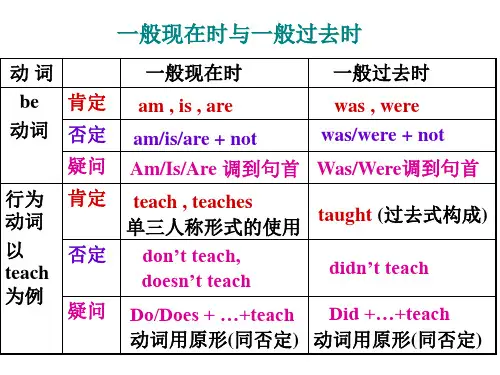
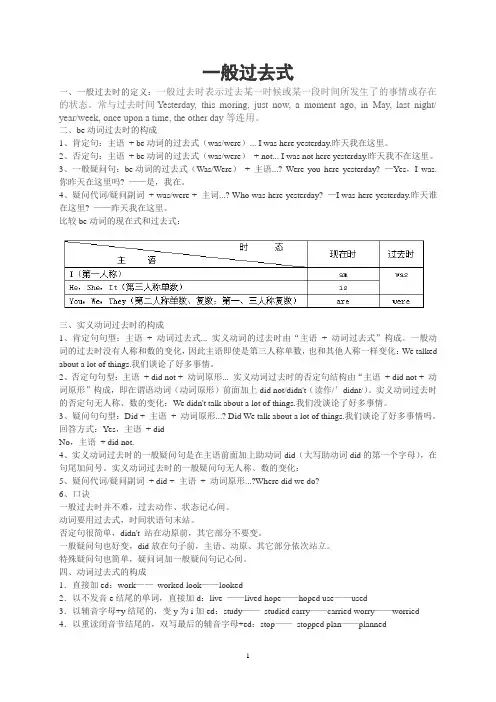
一般过去式一、一般过去时的定义:一般过去时表示过去某一时候或某一段时间所发生了的事情或存在的状态。
常与过去时间Yesterday, this moring, just now, a moment ago, in May, last night/ year/week, once upon a time, the other day等连用。
二、be动词过去时的构成1、肯定句:主语+ be动词的过去式(was/were)... I was here yesterday.昨天我在这里。
2、否定句:主语+ be动词的过去式(was/were)+ not... I was not here yesterday.昨天我不在这里。
3、一般疑问句:be动词的过去式(Was/Were)+ 主语...? Were you here yesterday? —Yes,I was.你昨天在这里吗? ——是,我在。
4、疑问代词/疑问副词+ was/were + 主词...? Who was here yesterday? —I was here yesterday.昨天谁在这里? ——昨天我在这里。
比较be动词的现在式和过去式:三、实义动词过去时的构成1、肯定句句型:主语+ 动词过去式... 实义动词的过去时由“主语+ 动词过去式”构成。
一般动词的过去时没有人称和数的变化,因此主语即使是第三人称单数,也和其他人称一样变化:We talked about a lot of things.我们谈论了好多事情。
2、否定句句型:主语+ did not + 动词原形... 实义动词过去时的否定句结构由“主语+ did not + 动词原形”构成,即在谓语动词(动词原形)前面加上did not/didn't(读作/′didnt/)。
实义动词过去时的否定句无人称、数的变化:We didn't talk about a lot of things.我们没谈论了好多事情。
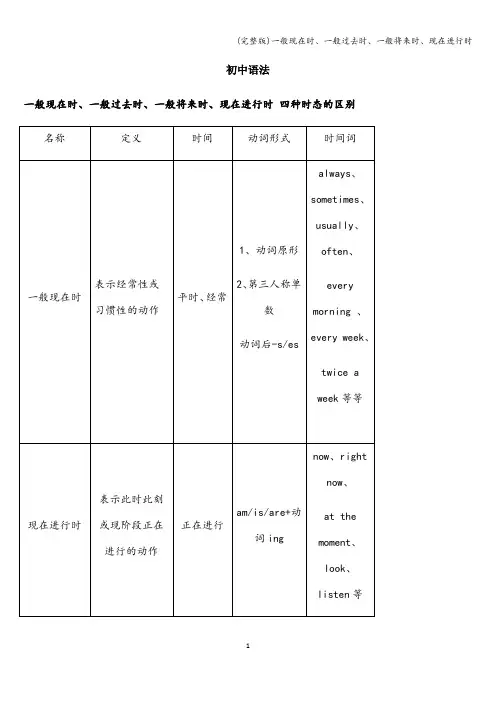
初中语法一般现在时、一般过去时、一般将来时、现在进行时四种时态的区别注意:1、一般现在时——第三人称单数的动词变化规则:1)大多数动词在词尾加“S"如:stop-______ ; make-______ read-______ ; play-______2)以辅音字母加“y”结尾的,要先将“y”变为“i",然后在加“es”如:fly-______ ; carry-______ study-______ ; worry-______3)以“s, x, ch, sh”结尾的,在词尾加“es"如:teach-______ ; watch-______4)以“o”结尾的动词,加“es”如:go-______ do-______2、现在进行时——动词ing形式的变化规则1.一般动词直接在词尾+ing例:read→______ (读) talk→______(交谈) sing→______(唱歌)2。
以不发音e结尾的动词,先去e再加ing例:like→______喜欢 write→______写 skate→______(滑冰)3。
以重读闭音节结尾且末尾只有一个辅音字母的动词,双写末尾字母,再加ing 例:stop→______(停止) get→______(得到)4.少数几个以ie结尾的动词,变ie为f再加ing.例:lie→______(躺、撒谎) tie→______(系、捆绑)3、一般过去时——动词的变化规则(1)一般在动词后加-ed。
如:play-______, offer-______, weigh—______, destroy—______, sign—______(2)在以字母e结尾的动词后,只加-d。
如:like—______, provide-______, hate - ______ date-______(3) 在以“辅音字母+y”结尾的动词后,则改y为i,再加—ed。
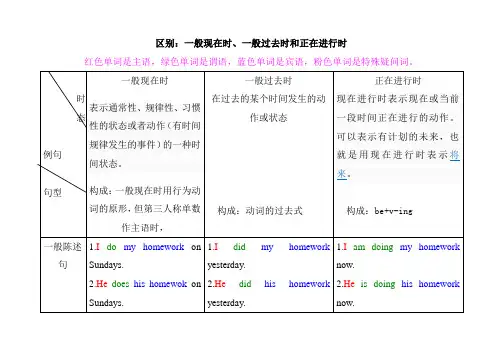
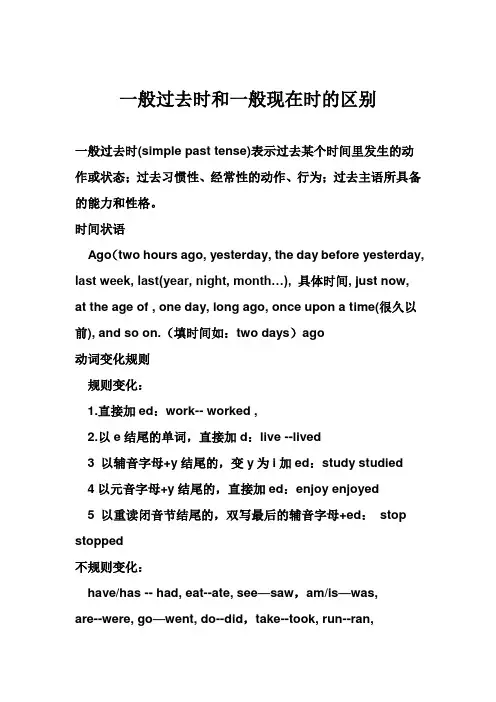
一般过去时和一般现在时的区别一般过去时(simple past tense)表示过去某个时间里发生的动作或状态;过去习惯性、经常性的动作、行为;过去主语所具备的能力和性格。
时间状语Ago(two hours ago, yesterday, the day before yesterday, last week, last(year, night, month…), 具体时间, just now,at the age of , one day, long ago, once upon a time(很久以前), and so on.(填时间如:two days)ago动词变化规则规则变化:1.直接加ed:work-- worked ,2.以e结尾的单词,直接加d:live --lived3 以辅音字母+y结尾的,变y为i加ed:study studied4以元音字母+y结尾的,直接加ed:enjoy enjoyed5 以重读闭音节结尾的,双写最后的辅音字母+ed:stop stopped不规则变化:have/has -- had, eat--ate, see—saw,am/is—was,are--were, go—went, do--did,take--took, run--ran,lend--lent, sleep--slept, get—got, meet—met, bring—brought, buy—bought, think—thought, say—said, give—gave, put—put, write--wrote, swim--swam基本结构主语+动词过去式+其他否定形式①was/were+not;②在行为动词前加didn't,同时还原行为动词一般疑问句Did+主语+do+其他?例句She often came to help us in those days.I didn't know you were so busy.一般现在时:表示经常发生的动作或存在的状态,一般情况下在动词后加“s”或“es”。
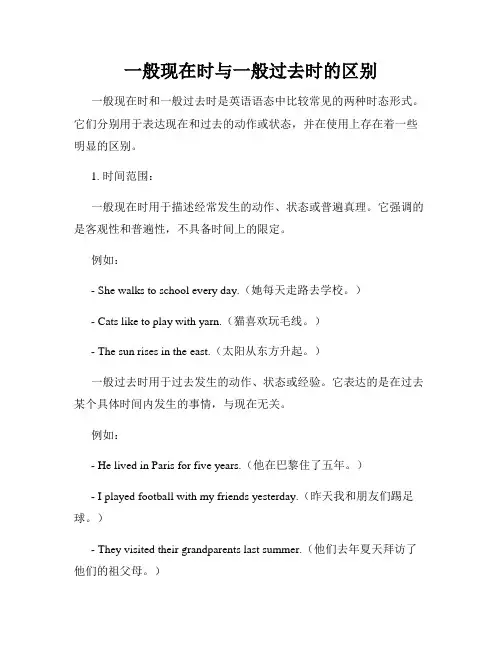
一般现在时与一般过去时的区别一般现在时和一般过去时是英语语态中比较常见的两种时态形式。
它们分别用于表达现在和过去的动作或状态,并在使用上存在着一些明显的区别。
1. 时间范围:一般现在时用于描述经常发生的动作、状态或普遍真理。
它强调的是客观性和普遍性,不具备时间上的限定。
例如:- She walks to school every day.(她每天走路去学校。
)- Cats like to play with yarn.(猫喜欢玩毛线。
)- The sun rises in the east.(太阳从东方升起。
)一般过去时用于过去发生的动作、状态或经验。
它表达的是在过去某个具体时间内发生的事情,与现在无关。
例如:- He lived in Paris for five years.(他在巴黎住了五年。
)- I played football with my friends yesterday.(昨天我和朋友们踢足球。
)- They visited their grandparents last summer.(他们去年夏天拜访了他们的祖父母。
)2. 动词形式:在一般现在时中,大多数动词使用原形;第三人称单数使用动词的第三人称单数形式(在动词后加-s/-es)。
例如:- I watch TV every evening.(我每天晚上看电视。
)- She often reads books in her free time.(她经常在空闲时间看书。
)在一般过去时中,大多数动词使用过去式形式来表示过去发生的动作或状态。
例如:- I watched a movie last night.(昨晚我看了一部电影。
)- He cooked dinner for his family yesterday.(昨天他给家人做了晚餐。
)3. 表示方式:一般现在时用于陈述客观事实或经常性动作,表达一种普遍真理。
例如:- Water boils at 100 degrees Celsius.(水在100摄氏度时沸腾。
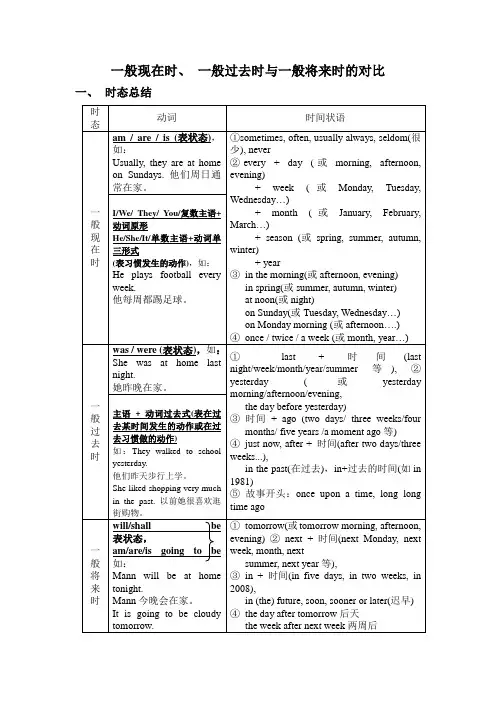
一般现在时、一般过去时与一般将来时的对比一、时态总结三.用动词的正确形式填空.1.I ______________ (be not) a middle school student. 2.Sam and I______________ (be) in different classes .3. ______________ you ______________ (have) a new watch?4. She______________ (make) a call to her parents once a week.5. It’s nine o’clock. It's time ______________ (play) games.6. I want ______________ (take) some books to the classroom.7. It's snowing now. We can go out and ______________ (play) in the snow.8. The men ______________ (work) near the house now.9. Look! The teachers ______________ (talk) to the students.10. It is true that the sun (rise) in the east and (fall) down in the west.11. I ______________ (leave) my jacket at your home just now.12. He______________ (be) born in 1982.13. Where ______________ your brother______________ (come) from?14. Bill ______________ (stay) at home every Sunday.15. I can ______________ (help) you to ______________ (carry) the things.16. Where ______________ you ______________ (go) tomorrow?17. Mike often______________ (read) English in the morning.He ______________ (like) ______________ (read) very much.18. ______________ they ______________ (speak) Japanese? Yes, they do.19. ______________ you ______________ (have) a good time at the cinema last night?20. There______________ (be) a meeting next week.21. Listen! Who ______________ (sing) next room?22. My father ______________ ( work) in the factory three years ago.23. He ______________ (not be) at school yesterday because he ______________ (be) ill.24. ______________ (be) there any water in the glass?25. He with his friends usually ______________ (play) football after school.四、根据首字母提示或所给中文完成下列句子:1.Don’t ______________ (打开) the door. It’s very cold.2.What are you ______________ (写), Betty?3.Guangzhou is one of the most modern(现代的) and beautiful ____________(城市) in China.4.__________ (课) Three is very hard. You must listen to the teacher _____________ (认真).5.They’re ______________ (来自) England.6.Tom is from______________ (美国) and he’s ______________ (美国人).7.What’s Jack’s ___________ _____________(姓)?8.Peter can talk a_____________ jobs in English.9.Sam and Betty b_____________ speak English.10.Linda can play basketball and r____________ a bike.11.My _____________(父母) take me to (拜访) my uncle every year.12.The tall _______________(建筑物) over there is the gym.13.Please ________________(欢迎) Betty and Tony to our school.14.My father is a teacher at Beijing ________________(国际的) school.五.用下面所给词的正确形式完成下列句子:be there behind dictionary some there bee-mail have got in one’s family make there be1. Are there __________________ maps on the wall in your classroom?2. _______________ many books in our school library.3. ________________ an English book on the teacher’s desk?4. The gym is ___________ the offices.5. Are there any __________________ in your bookshop?6. ___________________ any juice in the bottle?7. Here are some ______________ for you.8. Bill _________________ a small family.9. She has got eight people __________________.10. It’s eleven o’clock now. They ______________ kites. They’re going to fly kites next Saturday.六.阅读短文,从各题所给的A、B、C和D四个选项中,选出可以填入空白处的最佳答案。
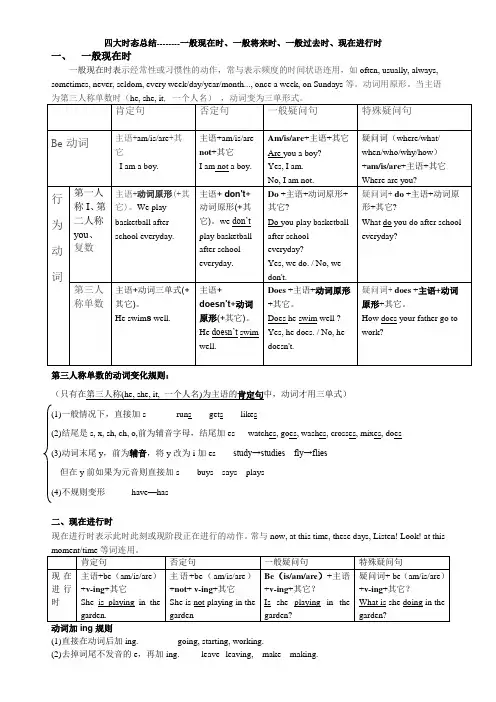
四大时态总结--------一般现在时、一般将来时、一般过去时、现在进行时一、一般现在时一般现在时表示经常性或习惯性的动作,常与表示频度的时间状语连用,如often, usually, always, sometimes, never, seldom, every week/day/year/month..., once a week, on Sundays等。
动词用原形。
当主语第三人称单数的动词变化规则:(只有在第三人称(he, she, it, 一个人名)为主语的肯定句中,动词才用三单式)(1)一般情况下,直接加s runs gets likes(2)结尾是s, x, sh, ch, o,前为辅音字母,结尾加es watches, goes, washes, crosses, mixes, does(3)动词末尾y,前为辅音,将y改为i加es study→studies fly→flies但在y前如果为元音则直接加s buys says plays(4)不规则变形have—has二、现在进行时现在进行时表示此时此刻或现阶段正在进行的动作。
常与now, at this time, these days, Listen! Look! at this动词加ing规则(1)直接在动词后加ing. going, starting, working.(2)去掉词尾不发音的e,再加ing. leave--leaving, make---making.注意:如果单词结尾的e发音,则不能去掉,也直接加ing. see –seeing agree - agreeing .(3) 对于动词只有一个元音,而其后跟了一个辅音字母时,双写末尾辅音字母再加ing.sitting, beginning run – running stop – stopping cut – cutting control – controlling(4)以ie结尾,把ie变y再加ing。
⼀般现在时现在进⾏时⼀般过去时⼀般现在时、现在进⾏时、⼀般过去时在七年级英语学习中我们主要学习了3种时态,即⼀般现在时、现在进⾏时、⼀般过去时。
今天我们就将这3种时态进⾏对⽐学习。
⼀、⼀般现在时定义:表⽰经常、反复发⽣的动作,经常存在的状态或者习惯性动作(有时间规律发⽣的事情)的⼀种时间状态。
具体⽤法1.表⽰经常的或习惯性的动作,常与表⽰频率的时间状语连⽤。
(always, usually, often, sometimes, every day\ morning\ night\ evening\afternoon\week,)e.g. I go to school at 8:00 every morning.2.表⽰主语具备的性格、能⼒、特征和状态及喜好等。
e.g She is 11 years old .I don’t like English.She can speak English well.3.表⽰客观事实和普遍真理。
e.g The earth moves around the sun.基本结构构成:含有be(am、is 、are)动词的⽤法结构:肯定句:I am+其它You \ they\ we are +其它She \he \ it+is +其它否定句:I am not+ 其它。
You \ they\ we are not +其它She \he \ it+is +not +其它⼀般疑问句及回答:单数:Are you +其它?肯定回答:Yes, I am. 否定回答:No, I am not.Is she\ he \it+其它?肯定回答: Yes,she \he \it is. 否定回答:No,she \he \it is not.复数:Are you\ they\ you+ 其它?肯定回答: Yes,we \they are. 否定回答:No, we \they are not.从上⾯结构中你能总结出be动词的⽤法吗?单数________,复数_________ ;我⽤_________,你⽤__________,______________-连着她他它。
be 动词用法歌:九份我用 am,你用 are,is 连结他,她,它。
单数名词用 is,复数名词全用are。
变疑问,往前提,句末问号莫抛弃。
变否认,更简单, be 后 notxx 忘掉。
疑问否认任你变,句首大写莫狐疑。
一、在下边的短文中填上适合be 动词。
I ______ a girl. My name _______ Mary. I ______ 12 years old. Here ______ my family photo. Look! These ______ my parents and those _______ my grandparents. This boy ______ my brother. He ________ 15 years old now. That ______ my cat, Mimi. It ______ very lovely.二、在下边的题目中填上适合的Be 动词。
1. I ________ Kitty.2. She _______ a student.3.Jane and Tom _________my friends.4. My sisters _______ tall.5._______ there a table in the room?6. There _____ some glasses on it.7.There ________many monkeys in the zoo.8.There_________ a beautiful rainbow in the sky.9.I _______ at school now.10. We ________ students.11.They ________ in the zoo.12. Yang Ling ________ ten years old.13.There ________ an apple on the plate.14. There ________ some milk in the glass15. The cat _______ on the chair.16. There _________some water in the glass.17.There __________ some bread on the table. 18. Where ________ your friends?19. How old __________ you?练习 :一、用 am, is, are 填空1)I _____a student.2) You ____ a doctor.3)____she Kitty?4) _____ you Chinese?5)He _____ in.6) It_____ a car.7)They ____ cars8) ____ your mother in the room?9)_____your friends in the room? 10) What ____ your name?11) These _____ buses.12) Those _____oranges.13) Where _____ your mother? 14) How old _____ your sister?仍旧子改写句子例题: 1. I __am___ a boy.__Are_ you a boy?No, I _am__ not.2.The girl______Jack ’s sister.3.The dog _______ tall and fat.4.Miss Zhang _______ a teacher.5.______ your brother in the classroom?6.She ______ at home.7.Mike and Kitty ______ in the zoo.8.This______ my dress.9.They _____ nice flowers.10 That ______ my red skirt.11. The books ______ on the desk.一般此刻时:1.表示事物或人物的特点、状态。
【英语知识点】一般过去时和一般现在时的区别一般现在时的用法:经常性或习惯性的动作,常与表示频度的时间状语连用。
时间状语:every…, sometimes,at…,on Sunday。
一般过去时的用法:在确定的过去时间里所发生的动作或存在的状态。
例如:时间状语有:yesterday,last week,an hour ago,the other day,in 1982等。
(1)表示过去某时间前已经发生的动作或情况,这个过去的时间可以用by,before等介词短语或一个时间短语从句来表示;或者表示一个动作在另一个过去动作之前已经完成。
例1:When we got there the basketball match had already started.我们到那里时,篮球赛已经开始了。
例2:I had finished my homework before supper.我在晚饭前已经把作业做完了。
This(That,it)is(was)the first(second….)time+定语从句:This(That,It)is(was)the only(last)+名词+定语从句;This(This,It)is(was)+形容词最高级+名词+定语从句。
如果主句的谓语动词是一般将来时,从句的谓语动词动词通常用现在完成时;如果主句谓语动词是一般过去时,从句的谓语动词通常用过去完成时。
例1:This is the first time(that)I’ve drunk Californian champagn e.这是我第一次喝加利福尼亚香槟酒。
例2:There was a knock at the door.It was the second time someone had interrupted me that evening.有人敲门,这是当天晚上第二次有人打扰我了。
感谢您的阅读,祝您生活愉快。